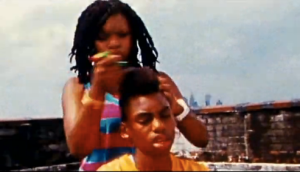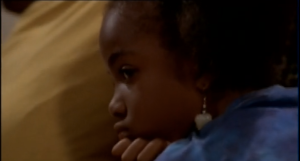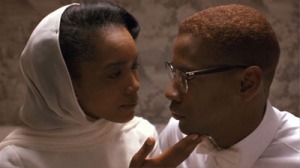“Womanhood” as depicted in the worlds of Spike Lee, is shown as though it were a destination that a girl one day arrived at with suitcases and ticket stubs in hand. Crooklyn’s Troy happens upon womanhood after her mother passes and she’s seen picking her brother’s hair out. Red Hook Summer’s Chaz does the same for Flik, and the soon-to-be Mrs. Shabazz describes how she lamented over X’s seriousness and decided she wanted to have many children with him.  Mrs. Shabazz’s strength lies in her furious defense of her h3usband, even when she runs the risk of upsetting him or stepping “out of her place”, she’s willing to stand up for the sake of her family, and more specifically, her husband. Much like the Gamma Rays, she can be seen as someone supporting her husband’s every move, keeping watch over the home, being father and mother in all reality to her children. But she never falters, and I would argue that we see her “reach womanhood” more than once: the first time when she’s speaking to X about their future together, and the second when she’s questioning if that future still exists in light of his impending betrayal. In both cases, Mrs. Shabazz is taking care of her husband’s physical health while communicating that she will always be there to support and care for him.
Mrs. Shabazz’s strength lies in her furious defense of her h3usband, even when she runs the risk of upsetting him or stepping “out of her place”, she’s willing to stand up for the sake of her family, and more specifically, her husband. Much like the Gamma Rays, she can be seen as someone supporting her husband’s every move, keeping watch over the home, being father and mother in all reality to her children. But she never falters, and I would argue that we see her “reach womanhood” more than once: the first time when she’s speaking to X about their future together, and the second when she’s questioning if that future still exists in light of his impending betrayal. In both cases, Mrs. Shabazz is taking care of her husband’s physical health while communicating that she will always be there to support and care for him.
 So, perhaps, this was the purpose of Lee’s movie. Granted, it’s easy to, and probably not incorrect, to assume that certain things were left out of the movie because they would be unpalatable to the audience, but I think they were also left out because they didn’t apply directly to X’s life. Having X preach things that he might never have actually practiced was risky, and especially in a society still sensitive to black leaders speaking, he might have felt it safer to use this tried and true method. But, what defined X, and his relationship both to his followers and his wife, was the way he treated them. Sure, you can discern womanhood and its accompanying characteristics by reading between the lines, but the lines are simply to guide us in our viewing, not to keep us out intellectually. For Lee, womanhood lies in the place where women can become bigger than themselves and domesticated, becoming concerned with the safety of hearth, home, and another; trapped Tina, who angrily wanders her apartment with a permanently-sleeping toddler on her hip, berates Mookie to grow up because he shows no interest in “being a man” or taking care of his son and spending time with her. Bleek is saved by finding a wife, and through her, a son. To Lee, you are granted your “hood”, be it wo/manhood through domestication and the admission of being in a position of relative subservience.
So, perhaps, this was the purpose of Lee’s movie. Granted, it’s easy to, and probably not incorrect, to assume that certain things were left out of the movie because they would be unpalatable to the audience, but I think they were also left out because they didn’t apply directly to X’s life. Having X preach things that he might never have actually practiced was risky, and especially in a society still sensitive to black leaders speaking, he might have felt it safer to use this tried and true method. But, what defined X, and his relationship both to his followers and his wife, was the way he treated them. Sure, you can discern womanhood and its accompanying characteristics by reading between the lines, but the lines are simply to guide us in our viewing, not to keep us out intellectually. For Lee, womanhood lies in the place where women can become bigger than themselves and domesticated, becoming concerned with the safety of hearth, home, and another; trapped Tina, who angrily wanders her apartment with a permanently-sleeping toddler on her hip, berates Mookie to grow up because he shows no interest in “being a man” or taking care of his son and spending time with her. Bleek is saved by finding a wife, and through her, a son. To Lee, you are granted your “hood”, be it wo/manhood through domestication and the admission of being in a position of relative subservience.
